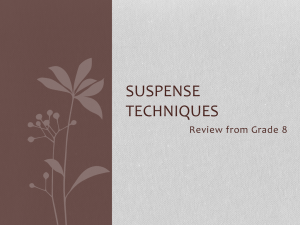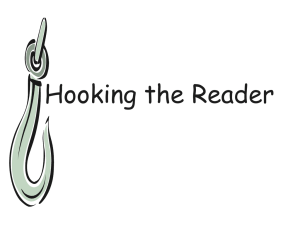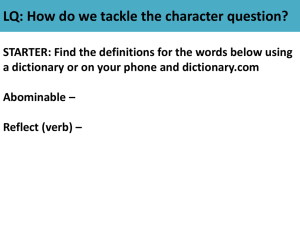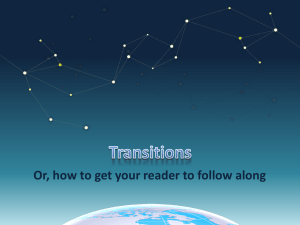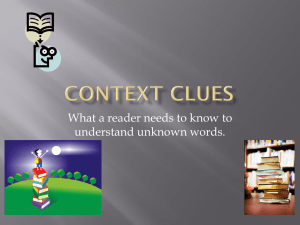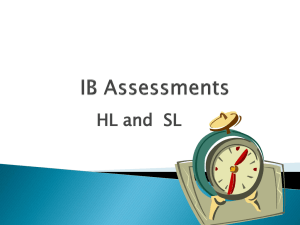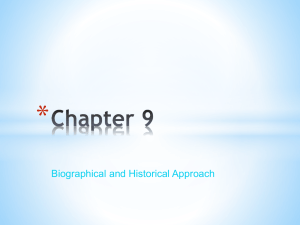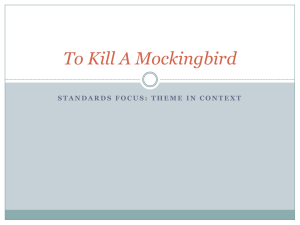Literature section A feedback
advertisement
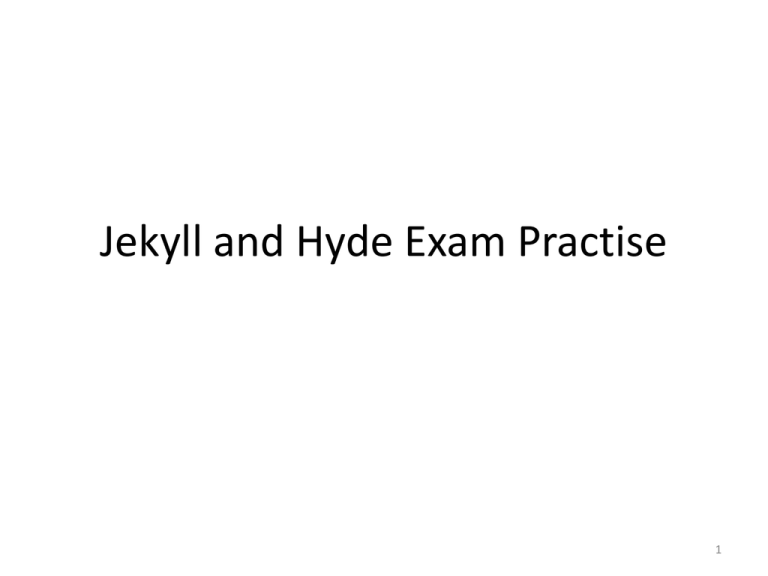
Jekyll and Hyde Exam Practise 1 Section A – extract taken from chapter 7 The incident at the window. . The court was very cool and a little damp, and full of premature twilight, although the sky, high up overhead, was still bright with sunset. The middle one of the three windows was half-way open; and sitting close beside it, taking the air with an infinite sadness of mien, like some disconsolate prisoner, Utterson saw Dr. Jekyll. "What! Jekyll!" he cried. "I trust you are better." "I am very low, Utterson," replied the doctor drearily, "very low. It will not last long, thank God." "You stay too much indoors," said the lawyer. "You should be out, whipping up the circulation like Mr. Enfield and me. (This is my cousin--Mr. Enfield--Dr. Jekyll.) Come now; get your hat and take a quick turn with us." "You are very good," sighed the other. "I should like to very much; but no, no, no, it is quite impossible; I dare not. But indeed, Utterson, I am very glad to see you; this is really a great pleasure; I would ask you and Mr. Enfield up, but the place is really not fit." "Why, then," said the lawyer, good-naturedly, "the best thing we can do is to stay down here and speak with you from where we are." "That is just what I was about to venture to propose," returned the doctor with a smile. But the words were hardly uttered, before the smile was struck out of his face and succeeded by an expression of such abject terror and despair, as froze the very blood of the two gentlemen below. They saw it but for a glimpse for the window was instantly thrust down; but that glimpse had been sufficient, and they turned and left the court without a word. In silence, too, they traversed the by-street; and it was not until they had come into a neighbouring thoroughfare, where even upon a Sunday there were still some stirrings of life, that Mr. Utterson at last turned and looked at his companion. They were both pale; and there was an answering horror in their eyes. "God forgive us, God forgive us," said Mr. Utterson. But Mr. Enfield only nodded his head very seriously, and walked on once more in silence Section A • Dr Jekyll and Mr Hyde 2 Answer all parts of the question. (a) From the extract, what do you discover about the character of Mr Utterson? Use evidence from the extract to support your answer. (8) (b) Comment on the effect of the language used to present Dr Jekyll. Use examples of the writer’s language from the extract. (10) (c) Explore the significance of Horror in this extract. Use evidence from the extract to support your answer. (10) (d) Explore the significance of Horror in one other part of the novel. Use examples of the writer’s language to support your answer. (12) (Total for Question 2 = 40 marks) A) Character GOOD P: 2 points that the reader discovers with good vocabulary. E: A detailed quote that is relevant to the character. E: Re-quoting key word (+ language feature) and what it shows about the character. This should be repeated at least twice. L: What the reader learns about the character and how they react. E: If you can evaluate the character’s presentation. C: How what the reader discovers reflects context information explained clearly. “This reflects…” BAD 1. Mono-syllabic adjectives or an incorrect opening point. 2. Missing the best quotes or an irrelevant quote. 3. No or minimal comments on what the reader discovers. 4. No reader reaction. 5. No context or unexplained. 4 A) Character The reader discovers that Utterson is___________________ and ____________________ in this extract. An example of this is; “Mr. Utterson at last turned and looked at his companion. They were both pale; and there was an answering horror in their eyes. "God forgive us, God forgive us," said Mr. Utterson.” The word ‘horror’ suggests to the reader that Utterson is_____________________ because________________. Similarly the repetition of ‘God forgive us’ informs the reader that Utterson is__________________ because__________________________. Also the words ‘at last’ implies that Utterson is______________________________ because_______________________. Finally the word ‘pale’ helps the reader discover that Utterson is_______________________ _because ____________________. The reader is left feeling ___________________ because__________________________________. This moment could reflect______________________________________________________ because____________________________________________________. 5 B) Language GOOD P: A point about how the language effects the reader – What does it make them think or feel about the topic. E: A detailed quote that is relevant to the effect and topic. E: Re-quoting key word + language feature and what it shows about the topic and how and why the quote effects the reader. This should be repeated at least twice. L: Overall what is the reader’s reaction. E: If you can, evaluate the effectiveness of the language. C: How does the effect of the language link to context and why. BAD 1. Focusing on the topic not the effect. 2. Missing the best quotes or an irrelevant quote 3. No commenting on or explaining the effect. 4. No overall reader reaction. 5. No context or unexplained. 6. Only writing one paragraph. 6 B) Language The language used to describe Jekyll in this extract has an___________________ and ____________________effect. An example of this is; "I am very low, Utterson," replied the doctor drearily, "very low. It will not last long, thank God." The repetition of ‘low’ suggests to the reader that Jekyll is_____________________ This makes the reader feel________________ because__________________ . Similarly the adverb of ‘drearily’ informs the reader that Jekyll is__________________. This makes the reader think that _______________________because __________________________. Overall the reader is left feeling ___________________ because__________________________________. The language in this extract could reflect___________________________________________ because____________________________________________________. Repeat with another quote 7 C) Theme GOOD P: Identifying a key moment for the theme and why it is a significant moment. E: A detailed quote that is relevant to the theme. E: Re-quoting key word (+ language feature) and what it shows about the theme and how and what the reader learns about the theme. This should be repeated at least twice. L: Overall what is the reader’s reaction. E: If you can, evaluate the effectiveness of the presentation of the theme. C: How does the theme link to context and why. BAD 1. Just stating a moment or stating the theme. Being unspecific 2. Missing the best quotes or an irrelevant quote 3. Not comment on what the language shows about the theme. 4. No comment on what the reader learns. 5. No overall reader reaction. 6. No context or unexplained. 8 C) Theme A key moment for the theme of horror is__________________________. This is significant because__________________________ An example of this is; “The smile was struck out of his face and succeeded by an expression of such abject terror and despair, as froze the very blood of the two gentlemen below.” The word ‘froze’ suggests to the reader that_____________________ This is horrific because________________ __________________ . Similarly the emotive words ‘terror’ and ‘despair’ show__________________. This is linked to horror because__________________________. Overall the reader is learns that horror is ___________________ and are left feeling ______________________ because _____________. The language in this extract could reflect___________________________________________ because____________________________________________________. Repeat with another quote 9 D) Theme + New extract GOOD 1. Introducing the extract, the chapter the key moments or events. Pg number. P: Identifying a key moment for the theme and why it is a significant moment. E: A detailed quote that is relevant to the theme. E: Re-quoting key word (+ language feature) and what it shows about the theme and how and what the reader learns about the theme. This should be repeated at least twice. L: Overall what is the reader’s reaction. E: If you can, evaluate the effectiveness of the presentation of the theme. C: How does the theme link to context and why. BAD 1. No introduction to the extract or multiple extracts. 2. Just stating a moment or stating the theme. Being unspecific 3. Missing the best quotes or an irrelevant quote 4. Not comment on what the language shows about the theme. 5. No comment on what the reader learns. 6. No overall reader reaction. 7. No context or unexplained. 10

